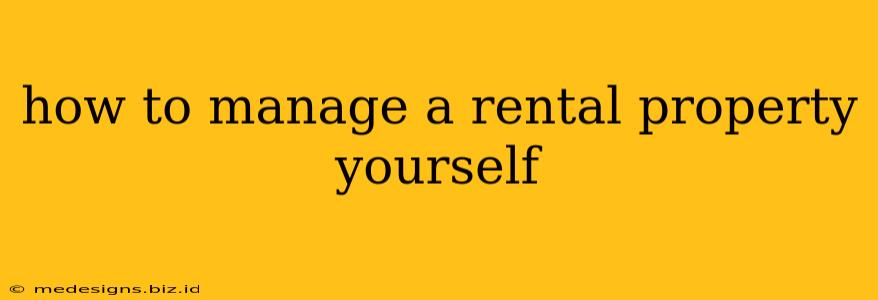Managing a rental property can seem daunting, but with the right approach, you can successfully handle it yourself and maximize your returns. This comprehensive guide provides a step-by-step approach to effectively managing your rental property without the need for a property management company.
Finding and Screening Tenants: The Foundation of Successful Rental Management
The process of finding reliable tenants is crucial. A thorough screening process significantly reduces the risk of costly problems down the line.
Marketing Your Rental Property:
- Online Listings: Utilize popular websites like Zillow, Apartments.com, Trulia, and Craigslist. High-quality photos and accurate descriptions are essential.
- Social Media: Leverage social media platforms to reach a wider audience.
- Local Networking: Consider posting flyers in your neighborhood or utilizing local bulletin boards.
Tenant Screening:
- Credit Checks: Verify the tenant's credit history to assess their financial responsibility.
- Background Checks: Conduct background checks to identify any criminal history.
- Rental History: Contact previous landlords to inquire about their payment history and overall tenancy.
- Employment Verification: Confirm the tenant's employment status and income to ensure they can afford the rent.
- Reference Checks: Request personal references to gather additional information about the tenant's character and reliability.
Creating a Solid Lease Agreement: Protecting Your Investment
A well-drafted lease agreement is the cornerstone of a successful landlord-tenant relationship.
- Clear Terms and Conditions: Include specific clauses regarding rent payment, lease duration, pet policies, maintenance responsibilities, and late fees.
- Legal Compliance: Ensure your lease complies with all applicable local, state, and federal laws. Consider consulting with a real estate attorney to review your lease agreement.
- Detailed Inventory: Create a detailed inventory of the property's condition, including any existing damages or repairs. Both you and the tenant should sign and date this inventory.
Handling Maintenance and Repairs: Maintaining Property Value
Proactive maintenance is key to preventing costly repairs and maintaining the value of your property.
- Regular Inspections: Conduct routine inspections to identify and address minor issues before they escalate.
- Emergency Repairs: Establish a system for handling emergency repairs, such as plumbing leaks or heating malfunctions. Have a list of reliable contractors on hand.
- Preventative Maintenance: Schedule regular preventative maintenance, like cleaning gutters, inspecting appliances, and checking smoke detectors.
- Tenant Responsibilities: Clearly define the tenant's responsibilities for maintenance and repairs in your lease agreement.
Managing Rent Collection and Finances: Streamlining Your Process
Efficient rent collection and financial record-keeping are crucial for successful rental property management.
- Online Payment Options: Offer convenient online payment options to streamline rent collection.
- Lease Payment Tracking: Utilize a spreadsheet or software to track rent payments and ensure timely collection.
- Separate Bank Account: Open a separate bank account for your rental income to manage finances effectively.
- Accurate Record Keeping: Maintain detailed records of all income and expenses related to the property. This is essential for tax purposes.
Staying Compliant with Laws and Regulations: Avoiding Legal Issues
Familiarize yourself with all applicable landlord-tenant laws in your area.
- Fair Housing Laws: Strictly adhere to fair housing laws to avoid discrimination.
- Local Ordinances: Understand and comply with local ordinances related to rental properties.
- Regular Updates: Stay updated on changes in landlord-tenant laws and regulations.
Building a Strong Landlord-Tenant Relationship: Fostering Positive Communication
Open and clear communication is essential for a positive landlord-tenant relationship.
- Prompt Responses: Respond promptly to tenant inquiries and concerns.
- Respectful Communication: Maintain a respectful and professional demeanor in all interactions.
- Regular Communication: Consider scheduling regular communication with your tenants, perhaps through a brief check-in call or email.
By following these steps, you can effectively manage your rental property yourself, saving on management fees while maintaining a profitable investment. Remember, thorough preparation and proactive management are key to success!
